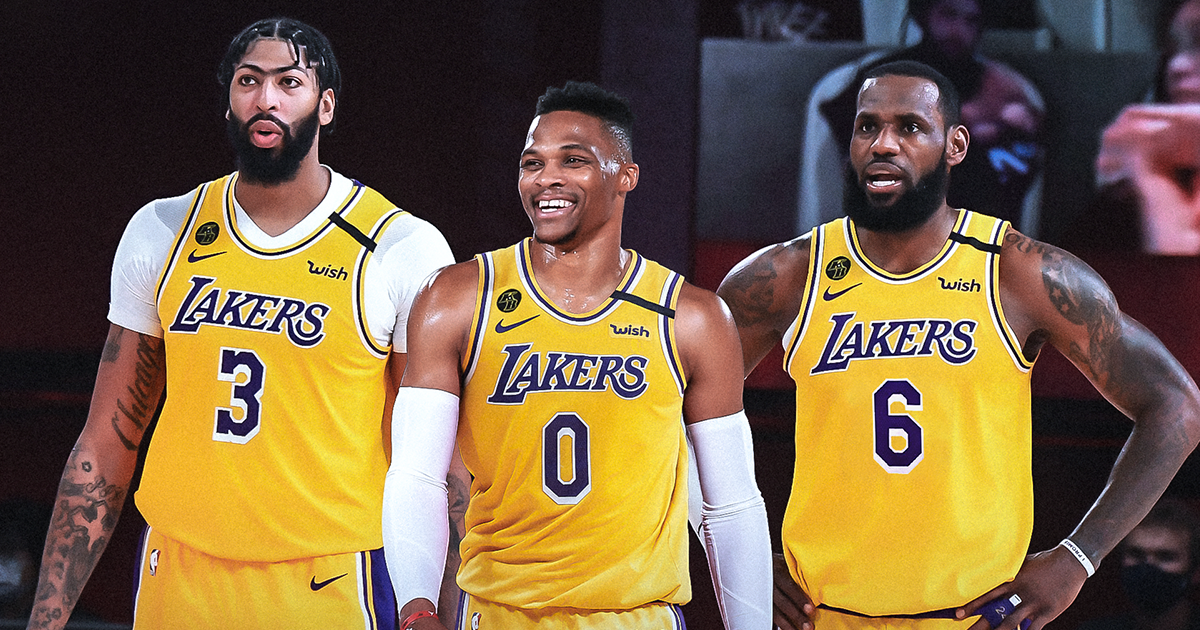The 240 Minutes Series Explained:
In the NBA there are 450 players under full contracts to start every season. These players consist of superstars, all-stars, average players, guys dealing with injuries, benchwarmers, rookies, ring-chasers, and whatever Hassan Whiteside is. Despite the contracts, draft capital, coaching, potential, friendships, and experience that all play a role in rotation minutes, there are only 240 minutes every game to go around and split amongst the players.
In this series, we cut through all of that. Join the fun as we dig into the rosters of every NBA team and project how many rotation minutes will be played by each player to begin the season. This takes into account all active injuries and thinks about the rosters in terms of which 9-12 players on each team will actually be playing for their respective team for the first few weeks of the regular season. In addition to this, we will discuss the positions that they will be playing, why their minutes per game total is calculated where it is, and showcase the quality of the player that is allotted those minutes. The “quality of player” tiers will look as such:
MVP Candidate – Top 10 player and potential to win MVP this season
All-NBA Candidate – Top 30 player and potential to be on an All-NBA Team this season
High-End Starter – Quality starter with potential to make the All-star game this season
Starter – Quality starter and is (roughly) a top 120 player this season
Low-End Starter – Starts but is not (roughly) a top 120 player this season
Elite 6th Man – Does not start but is a top (roughly) 120 player and could win 6MOTY this season
High-End Backup – Does not start but could if needed and perform well
Backup – Does not start but is a quality role player
Low-End Backup – Could see minutes during regular season but might not make playoff rotation
Without further ado:
Where Will the 240 Minutes on the Los Angeles Lakers Go?
Russell Westbrook PG – All-NBA Candidate (34 minutes per game)
While Westbrook will be the third fiddle on this Lakers team and there have been big questions about his fit with the other two superstars, Westbrook is the clear candidate to lead LAL in minutes this season. He has averaged 36 minutes per game the last four seasons and will run a lot of point guard this year for the purple and gold. With no other listed PGs on the roster, Westbrook and LeBron will be the primary ball handlers, with Kendrick Nunn providing some backup point guard minutes as well. While Westbrook is starting to slow down slightly, he is still only 32 years old and has averaged a triple double in four of the last five seasons. 36 minutes per game would be a surprise this year with the amount of depth the Lakers have, but 33-34 minutes is likely where Russ ends up at.
LeBron James PG/SF/PF – MVP Candidate (33 minutes per game)
LeBron, coming off of an MVP level first half and injury riddled second half of the season last year, enters his 19th season at age 36. The King is still an All-NBA caliber player and even a fringe MVP candidate going into 2021-2022. LeBron has averaged 25+ points per game every season in the NBA since his rookie year. With Westbrook and AD on the roster now, LeBron may dip below that mark for the first time since 2004, but will likely make up for it with more playmaking and rebounding as well as potentially higher efficiency. He played a career low 33.4 minutes per game last season and Frank Vogel will surely keep him below the 34-minute mark again as LeBron sits at 61,090 career minutes played (including playoffs).
Anthony Davis PF/C – MVP Candidate (33 minutes per game)
In the most disappointing season of his career to date, Davis was repeatedly injured last year only playing in 41 games. Even when on the court, AD was very inefficient from everywhere on the court, shooting a career low percentage from the field and free throw line and had his worst 3-point shooting season since 2015. Davis also posted career lows in rebounds and blocks. With that being said, look for Anthony Davis to have a bounce back year and even be a sleeper MVP candidate if he can remain healthy. Davis averaged 32.3 minutes per game last season and should stay right around that as he plays a little less PF with the incoming free agents but more minutes at C.
Talen Horton-Tucker SG/SF – Low-End Starter (24 minutes per game)
After the big 3 on the Lakers, the only other player who is getting paid substantial money this season is THT, who received a 3 year/32million contract this offseason. The Lakers also let the longtime high energy guard, Alex Caruso, walk in free agency. With nearly everyone else on the roster being on a veteran minimum contract it speaks very highly that Rob Pelinka was willing to pay THT. While some sources believe that Wayne Ellington will start at SG for the Lakers this season because of the better schematic fit, Horton-Tucker has the relationship with LeBron and AD already and is a significantly better defender than Ellington. He will have to work on his 3-point shooting (28.2% last season) but THT played a respectable 20.1 minutes per game last season and should see an uptick in minutes after getting paid.
Carmelo Anthony SF/PF – High-End Backup (23 minutes per game)
Melo is the epitome of an aging veteran who took a pay-cut to ring chase late in their career. He now gets to play with his great friend, LeBron James, which is something that had been hinted at for years. While he is well past his prime, Anthony has shown to be a high-level role player for the Blazers the last few years (even shooting 40.9% from three last season on high volume). Melo should be a nice 6th-7th man off the bench for the Lakers. He averaged 24.5 minutes per game last season.
Kendrick Nunn PG/SG – High-End Backup (19 minutes per game)
Nunn was a key free agent pick up for Los Angeles as a young player who has experience playing in big games. He also started 111 games the past two seasons for the Miami Heat and is good insurance pending any Russell Westbrook injuries. He was signed to the MLE for the Lakers and will slide into the backup point guard spot. Nunn averaged 29.5 minutes per game the last two seasons but also saw his minutes dip in the playoffs to 17.5 per game.
Marc Gasol C – Low-End Starter (18 minutes per game)
Behind just Udonis Haslem, Andre Iguodala, JJ Redick, and fellow teammates Carmelo Anthony and LeBron James, Marc Gasol is now the 6th oldest current NBA player. Last season Marc had career lows in points, rebounds, and minutes but appears to be set to start for the Lakers yet again as Anthony Davis avoids the center spot as much as possible. Gasol is nearing the end of his career and only played 30+ minutes in one game last season. He averaged 19.1 minutes per game and will likely see even less time this year.
Dwight Howard C – Backup (16 minutes per game)
Dwight Howard basically is who he is at this point in his career. The ex-superstar is now a bruising, rebounding, and defensive oriented backup center. He averaged 7.0 points and 8.4 rebounds last season in Philadelphia in 17.3 minutes per game. Howard looks to fill in the same role as he did in the 2019-2020 title season for the Lakers when he backed up Javale McGee.
Wayne Ellington SG – High-End Backup (12 minutes per game)
Set to embrace his second stint with the Lakers, NBA journeyman, Wayne Ellington, has been on 9 different franchises. Initial rumors after his signing were that Ellington would start at SG for the Lakers as he comes off of a nice season where he shot 42.2% from deep. He averaged 22.0 minutes per game and started 31 games for Detroit. After signing Talen Horton-Tucker to a long-term deal and signing young guards Kendrick Nunn and Malik Monk, the situation has become much murkier. Regardless, Ellington should have a role on this team as a spot up shooter, whether it’s in the starting 5 or off of the bench.
Malik Monk SG – Backup (12 minutes per game)
The Malik Monk signing never made much sense from the player aspect, but for Los Angeles it was an amazing signing. It appears that the 23-year-old took a significant pay-cut to come play with some of the superstars he watched growing up. Monk had the best season of his career last year, averaging 11.7 points per game on his most efficient shooting season, including 40.1% from three. It is unclear how much he will actually play on this deep roster, but the youth and upside are enticing and he should get a long look from Frank Vogel.
Trevor Ariza SF/PF – Backup (12 minutes per game)
Ariza is the exact opposite of Malik Monk. The 17-year-veteran is the definition of an average NBA player but brings nothing special to the table. Last season Ariza had shooting splits of 41.1/35.0/77.3 and is okay as an 8th-9th man but is also incredibly underwhelming. He averaged 28.0 minutes per game last season but will surely take a back seat on the Lakers.
Kent Bazemore SG/SF – Backup (4 minutes per game)
Bazemore brings similar attributes to this Los Angeles roster as Trevor Ariza. He is slightly worse defensively and a marginally better shooter, but is still inconsistent. He is also younger than Ariza, but does not present the upside of a Malik Monk, THT, or Kendrick Nunn. Bazemore averaged 19.9 minutes per game last year with Golden State but he is probably the odd man out of this rotation early in the season until players get hurt or begin to rest.
Projected Nightly Depth Chart:
PG: Russell Westbrook/Kendrick Nunn/LeBron James
SG: Talen Horton-Tucker/Wayne Ellington/Malik Monk
SF: LeBron James/Trevor Ariza/Kent Bazemore
PF: Anthony Davis/Carmelo Anthony/Trevor Ariza
C: Marc Gasol/Dwight Howard/Anthony Davis
Not in Initial Rotation:
Chaundee Brown SF
Matt McClung PG
Joel Ayayi PG/SG (Two-Way)
Austin Reaves PG (Two-Way)




